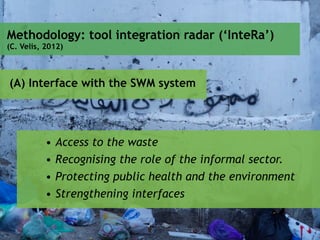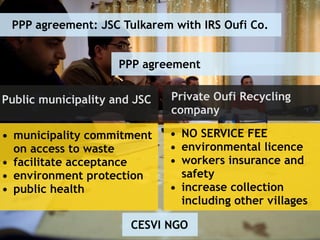Presentazione PP WM
- 1. Waste Management informal sector, Riad Oufi recycling company formalisation process in PPP with Tulkarem JSC
- 2. Overview of the Informal Recycling Sector (IRS) “the informal solid waste sector refers to individuals or enterprises who are involved in recycling and waste management activities but are not sponsored, financed, recognised or allowed by the formal solid waste authorities, or who operate in violation of or in competition with formal authorities” (GIZ, 2006)
- 3. Recycling is first of all an economic activity of commodities extraction, upgrading, and trading, and as such it provides a livelihood for millions of persons worldwide (Scheinberg, 2010)
- 4. Street pickers Recovery Bottles, cans Landfill scavengers Recovery Bottles, paper, plastic Collection crews Recovery Collection crews Recovery Travelling buyers Door to door buying (announced collector) Paper, cardboard, glass bottles, aluminum cans, nylon Dealers neighborhood dealers or buyers Buying (retail) Small-scale entrepreneurs Buying, trading Large-scale entrepreneurs Buying and exporting/trading large-scale processing technology Metal, iron, steel, paper, cardboard, plastic bottles, glass bottles, tires, miscellaneous IRS forms (Mohammad Said Al Hmaidi, 2014)
- 5. When an active informal sector is removing waste for recycling at different points of the system, the result is that waste composition figures may be measured after some recycling has already happened, so comparisons can be misleading. City authorities are often unaware of these nuances. (David C Wilson et al., 2012) Waste management analysis should study the IRS
- 6. workers rights care not covered not included in the local tax system child labor no monitoring of environmental degrada8on prac8ces, soil, water and air pollu8on IRS negative aspects low acceptance from the society (wider) scarce capital health risks posed to the related community or general public no legal status poor working condi8ons
- 7. high recovery rates (up to 80%) IRS positive aspects income to poor population experience on the recycling sector use of most appropriate technologies deep knowledge of the territory relationship with the surrounding population (narrow) reduce the cost for the formal Waste Management (20%)
- 8. What to do with IRS? One of the aims of modern waste management is to move ‘up the waste hierarchy,’ i.e. reduce the reliance on disposal and increase recycling: it would seem ironic to move forward by deliberately eliminating what can be a rather efficient, existing recycling system […] The preferred option is to integrate the informal sector into waste management planning, building on their practices and experience, while working to improve efficiency and the living and working conditions of those involved (David C. Wilson et al. 2006)
- 9. Studies have shown that in low-and middle-income countries the resource recovery rate by the informal sector is up to three times higher than by the formal solid waste management system. Informal recyclers are also able to valorize recyclable materials at lower costs than the formal sector due to their experience and special knowledge about identifying materials and marketing them. (SWEEPNET, 2014) The regional solid waste exchange of information and expertise network in Mashreq and Maghreb countries •Integrating the informal sector within any proposed SWM system.
- 10. (Maria Besiou et al., 2011) real ideal symbiotic 100.000.000 80.000.000 60.000.000 40.000.000 20.000.000 0 -20.000.000 NPV(€) 5 10 15 2 0 25 30 35 time (years) 25
- 11. The informal sector is clearly any city’s key ally. These human resources can be best deployed in the public interest through appropriate legal and institutional spaces. But that doesn’t imply that the informal recycling sector is a distinctly developing world phenomenon. The research here shows that it exists even in San Francisco, California, and Tompkins County, Ithaca, New York. (UNHABITAT, 2010) False belief
- 12. Carton collection in Tulkarem city and Alsha’sawiya and Wadi Alshaeer areas from commercial and industrial activities context analysis and survey on carton production and analysis of the informal sector based on the following: • questionnaires to shops and commercial activity under the survey • analysis of carton collection in other cities: Nablus, Jenin
- 13. IRS discovered in Tulkarem • Riad Oufi is collecting carton from commercial activities since 2009 • family business born as carton scavenger in municipal dumpsites • collecting around 60% of the carton from commercial activities in Tulkarem city • no collection in the surrounding municipalities • collection, transportation and manufacturer direct selling • carton, plastic and metal • partially accepted by the community
- 14. • included in the public sector (employed by municipalities or bodies related to WM) 2 options to include IRS in the formal WM: • as private sector with a PPP system (cooperatives, SME, associations, companies) PPP as strategy to keep the environmental standard and the concept the waste management is service to the population
- 15. (A) Interface with the SWM system (B) Interface with the materials and value chain (C) Social aspects and the interface with society (O) Organisation and empowerment Methodology: tool integration radar (‘InteRa’) (C. Velis, 2012)
- 16. (A) Interface with the SWM system • Access to the waste • Recognising the role of the informal sector. • Protecting public health and the environment • Strengthening interfaces Methodology: tool integration radar (‘InteRa’) (C. Velis, 2012)
- 17. (B) Interface with the materials and value chain • Improving the quality of the source material • Adding value to the products sold • Improving linkages along the value chain Methodology: tool integration radar (‘InteRa’) (C. Velis, 2012)
- 18. (C) Social aspects and the interface with society • Facilitating recognition and acceptance of the informal sector (by the wider society) • Work towards child education and gender equality and inclusivity • Occupational H&S Methodology: tool integration radar (‘InteRa’) (C. Velis, 2012)
- 19. (O) Organisation and empowerment • Organisation if IRS • Financial viability • Capacity building Methodology: tool integration radar (‘InteRa’) (C. Velis, 2012)
- 20. Public municipality and JSC PPP agreement: JSC Tulkarem with IRS Oufi Co. Private Oufi Recycling company PPP agreement • municipality commitment on access to waste • facilitate acceptance • environment protection • public health • NO SERVICE FEE • environmental licence • workers insurance and safety • increase collection including other villages CESVI NGO








![What to do with IRS?
One of the aims of modern waste management is to
move ‘up the waste hierarchy,’ i.e. reduce the reliance
on disposal and increase recycling: it would seem ironic
to move forward by deliberately eliminating what can
be a rather efficient, existing recycling system […]
The preferred option is to integrate the informal sector
into waste management planning, building on their
practices and experience, while working to improve
efficiency and the living and working conditions of those
involved (David C. Wilson et al. 2006)](https://image.slidesharecdn.com/presentazionefedepppred-160305094220/85/Presentazione-PP-WM-8-320.jpg)












